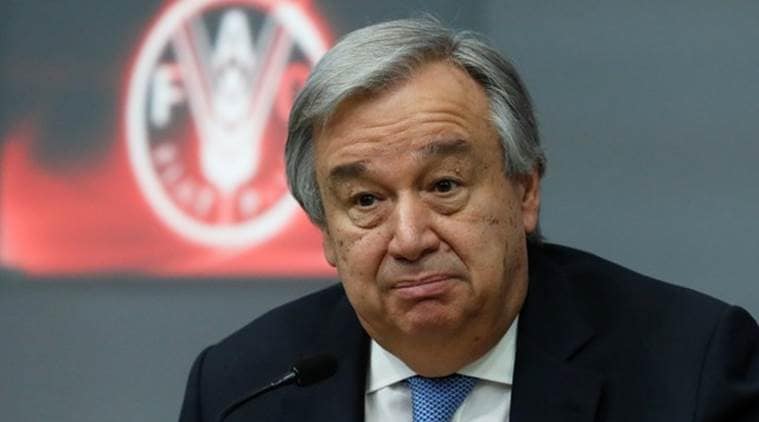UN chief Antonio Guterres urges conflict prevention and ‘diplomacy for peace’
The UN chief told the Security Council that he believes it is possible to reverse trends like the one in Central African Republic, which is why ``we must make prevention our priority.''

But Guterres stressed that conflict prevention must include investment in mediation, peacebuilding and economic development that preserves the environment. (Source: REUTERS/File)
Secretary-General Antonio Guterres said Wednesday the Central African Republic, which has suffered overlapping national and local conflicts for decades despite 15 peace agreements since 1997, is an example of why “diplomacy for peace” is needed more than ever.
The UN chief told the Security Council that he believes it is possible to reverse trends like the one in Central African Republic, which is why “we must make prevention our priority.”
1m 21s

Former UN leader Kofi Annan has died
Kofi Annan, the Nobel Peace Prize laureate and first black UN Secretary General, has died at the age of 80. Matthew Larotonda reports
But Guterres stressed that conflict prevention must include investment in mediation, peacebuilding and economic development that preserves the environment.
Archbishop of Canterbury Justin Welby went further, telling council members that mediation can only be effective when it takes place alongside reconciliation efforts.
“Where mediation is about resolving conflict, reconciliation is the process of transforming violent conflict into non-violent coexistence where communities have come to terms with history and are learning to disagree well,” Welby said. “Mediation by itself, however skilled, is like using a garden hose to put out a forest fire, when what you need is rain over the whole area to let new life grow and sustain itself.”
Since he became secretary-general in January 2017, Guterres has been focused on how to tackle wars, which he said are “becoming increasingly complex,” and mediating peace, which he said is also becoming increasingly difficult.
He said that today conflicts drag on for years and decades, and international attention drifts, with peace agreements becoming “more elusive and short-lived.”
Guterres said prevention and diplomacy are now top priorities.
UN envoys are pursuing mediation which may possibly lead to political solutions in Libya and Yemen, he said, and U.N. efforts have led to peacekeeping missions like the one in Mali, which is the deadliest for U.N. troops.
Noting last month’s peace declaration between Ethiopia and Eritrea after 20 years of conflict, Guterres said, the U.N. must move beyond “negotiations with political and military elites” to help build peace from the ground up. And he said the 193-nation world organizations must bring disparate tracks together to coordinate peace efforts.
Welby, who leads the Anglican church, said unlike many other organizations “the church and other faith communities are intimately present where there are conflicts.”
“We cannot and will not walk away from them,” he said, citing as an example conflict-wracked South Sudan where he said church leaders including Anglican Archbishop Justin Badi “are playing an increasingly important role in moving the whole peace process beyond the current roadblocks.”
Welby stressed that there will always be profound differences among and within nations.
“We have avoided global nuclear war, yet not its continuing menace,” he said.
But the archbishop warned that even in the Security Council the international “rules-based order is struggling” against national interests.
“Without dealing with even passionate disagreement peacefully, no national interest can prevail,” Welby warned. “Short term advantage for one interest leads to long term destruction for all, through great wars and small conflicts.”
British Minister of State Lord Tariq Ahmad, who chaired the meeting, told the council that “as the nature of conflict evolves, mediation will be needed more than ever” and “the United Nations must stand ready to ensure that it is equal to the task.”












































No hay comentarios:
Publicar un comentario